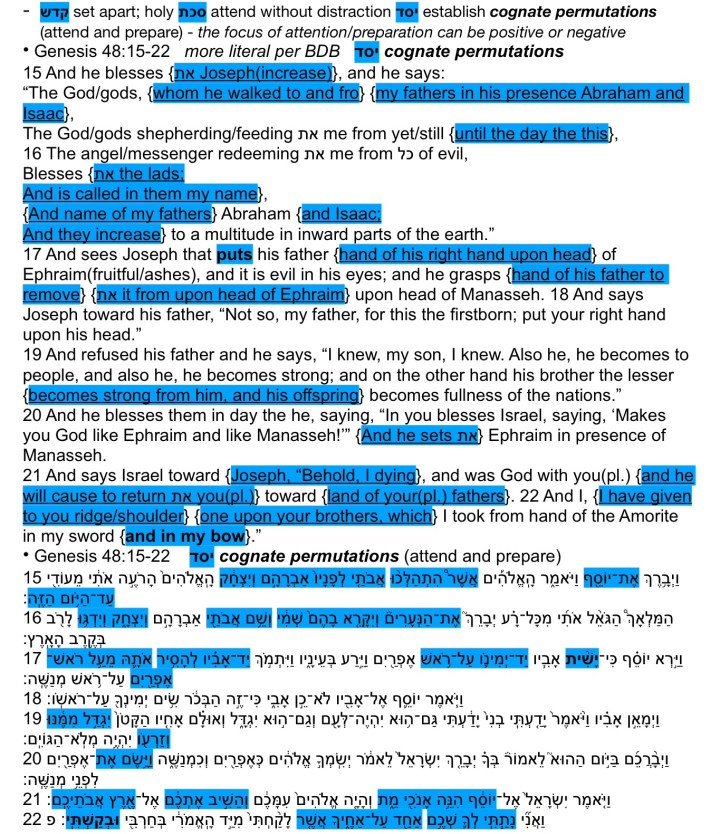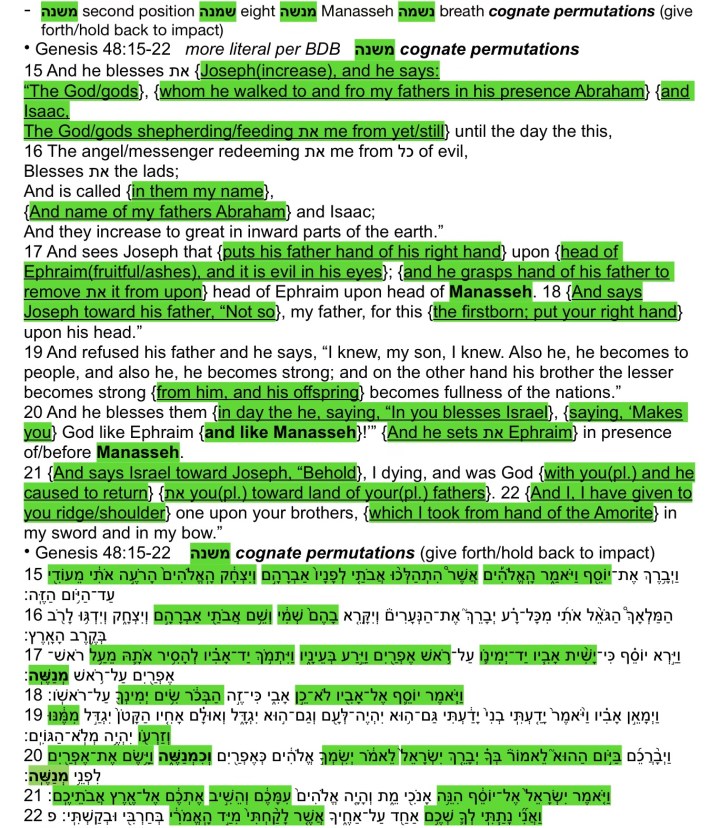We have just recently witnessed this Fall Festival, sometimes also called the Feast of Booths, the Feast of Ingathering, or the Season of our Rejoicing. I personally was involved in a long trek to participate with some family members and their congregation. The holiday coincides with the full moon, which symbolically connects with the idea of rejoicing. Because of ingathering, it is indeed a happy time, when the fruits of our labor are appreciated (there is also a Feast of Firstfruits that celebrates the earliest fruits of our labor).

The time is appropriate to spend a little time on the topic of Sukkot in relation to the cognate permutations method. And it is important to consider Scriptural references. Just to share, Sukkot סכות is also referred to as Succoth in English Bibles. You may recall that Succoth was the first stop of the “Exodus,” the Wilderness trek of the Israelites before crossing the Red Sea (Sea of Suph סוף) after leaving Egypt. סכות is Hebrew for “booths,” the plural of סכה sukkah/booth.
There are various maps of the journey, which vary because things have changed over thousands of years, so locations may be somewhat different or uncertain. Two points here: the first is that all agree that Succoth was the first stop after leaving Goshen. The second is that the route taken is not the most direct route to the land of Canaan, purposely because it was a time of training for the Israelites, “🎶A Long and Winding Road.” See Exodus 13:17-18. This is one map rendering:

Within the word Sukkot/Succoth is a root סכת which means to “concentrate; attend without distraction.” And I point out that Sukkot in Scripture was one of the three times in the year of keeping feasts for remembering to appear “toward the face of the Lord יהוה.” Exodus 23:14-17. This root סכת concentrate; attend without distraction is a reminder of the focus we are to have upon our LORD.
Turning to the cognate permutation group, I point out the meaning (in parentheses) and three important roots included in the group:
קדש set apart; holy סכת concentrate; attend without distraction יסד establish; foundation cognate permutations (attend and prepare) – the focus of attention/preparation can be positive or negative.
I will spend some time here on the root יסד establish; foundation, in “attending to and preparation for” some future discussions.
The Jewish historian Josephus indicates that Moses was a general in Egypt before leaving the kingdom. This information is NOT in Scripture, so I do not vouch for its accuracy. What IS in Scripture, as pointed out in Exodus 13:18 (depending on your translation) is that the Israelites came out in “orderly ranks” (some translations say “battle array,” but do recall this is men, women, children, and livestock, so orderly ranks might be more appropriate wording). Their first stop would have been a time of getting organized, of “establishing” some ground rules, of setting a “foundation” for the journey ahead. Recall they left “in haste” Exodus 12:33.
See the importance of this idea of getting established, of creating a foundation (paying attention and preparing) because it also refers back (thematic connections always) to the first occurrence of the word סכות Succoth in the Bible. [By the way, see how the behavior of both Esau and Jacob reflect their description in earlier references; Esau “pushes” in his behavior as “hairy” שׂער (Genesis 25:25 – “storm; strong movement from within) and Jacob “a mild man” (Genesis 25:27), in resisting the pushing, demonstrates sensitivity for the animals and children.]
⦁ Genesis 33:12-17
12 Then Esau said, “Let us journey on our way, and I will go ahead of you.” 13 But Jacob said to him, “My lord knows that the children are frail, and that the nursing flocks and herds are a care to me. If they are driven hard for one day, all the flocks will die. 14 Let my lord pass on ahead of his servant, and I will lead on slowly, at the pace of the livestock that are ahead of me and at the pace of the children, until I come to my lord in Seir.”
15 So Esau said, “Let me leave with you some of the people who are with me.” But he said, “What need is there? Let me find favor in the sight of my lord.” 16 So Esau returned that day on his way to Seir. 17 But Jacob journeyed to Succoth, and built himself a house and made booths for his livestock. Therefore the name of the place is called Succoth.

Building a house is an important message in Scripture, compared to moving about in a tent. It was a sign of “settling.”

Is there something in this nature of Jacob that is reflected in his behavior at the time of blessing Joseph’s sons Manasseh and Ephraim (Genesis 48)? (Please remember that “name” reflects nature or character. (Genesis 2:19)) Recall that the “firstborn” in Scripture is the one to carry on the nature and traditions of the family. What does Jacob intend to accomplish by putting Ephraim ahead of Manasseh in birth order? ((Also recall what the LORD tells Rebekah in Genesis 25:23 that the greater serves the lesser.))
⦁ Genesis 48:15-22
15 And he blessed Joseph, and said:
“God, before whom my fathers Abraham and Isaac walked,
The God who has fed me all my life long to this day,
16 The Angel who has redeemed me from all evil,
Bless the lads;
Let my name be named upon them,
And the name of my fathers Abraham and Isaac;
And let them grow into a multitude in the midst of the earth.”
17 Now when Joseph saw that his father laid his right hand on the head of Ephraim, it displeased him; so he took hold of his father’s hand to remove it from Ephraim’s head to Manasseh’s head. 18 And Joseph said to his father, “Not so, my father, for this one is the firstborn; put your right hand on his head.”
19 But his father refused and said, “I know, my son, I know. He also shall become a people, and he also shall be great; but truly his younger brother shall be greater than he, and his descendants shall become a multitude of nations.”
20 So he blessed them that day, saying, “By you Israel will bless, saying, ‘May God make you as Ephraim and as Manasseh!’” And thus he set Ephraim before Manasseh.
21 Then Israel said to Joseph, “Behold, I am dying, but God will be with you and bring you back to the land of your fathers. 22 Moreover I have given to you one portion above your brothers, which I took from the hand of the Amorite with my sword and my bow.”

יסד establishes a foundation, sets a direction, for the family/tribe of the two boys, paying attention and preparing. בית can mean literally a house or can mean household or family.


Please recall that we have spoken previously of the prefix ב “in” being derived from the root בית. Something that is “in” us is something that was formed within us by the house in which we grew up. This can be our literal house, our home of origin, but can also our culture, often greatly influenced by our country, our region, our state, our city. Our worldview is formed by the experiences we have lived and the culture (macro and micro) around us.
- Is there something about being in “second place” that Jacob knew from his own life, that he is trying to pass along? What is the “culture” defined by “second place” versus “first place.” Is it like Avis car rental advertisements once said, “We are in second place; we try harder?”

See that the בית group indicates allowing/embracing the consequences as established by God. There are benefits and drawbacks to any situation in which we have “settled,” in any choice that we have made. And the consequences as told by God to Rebekah, are that the greater serves the lesser, which is precisely what Yeshua/Jesus in the Beatitudes in Matthew 5:3-12 and Matthew 23:12; the idea is also seen in teachings like Luke 12:15-21; Mark 22:41-44. The world of Yeshua/Jesus is the upside-down world, which is what Jacob knew. In following the way that God established, one goes against the ways of the “world,” our always striving for bigger, for better, for towers that reach to the heavens. See in Deuteronomy 7:7 that Israel is chosen not because they are greater, but because they are lesser.
- The problem, of course, is that once we see that we are “chosen,” like Solomon, we tend to let it go to our heads. So, there must always be a nature of restraint built into our very fiber. Of course, the cycles are the natural way that restraint of growth flows, and it will happen to us if we do not choose it for ourselves. LORD willing, we may focus this discussion in the future toward where our country is.
What is your foundation? How does it impact upon others around you, in your own personal context, and in the entire world?
If you look at the cognate permutations group that includes שכת and יסד, you see that included is the root קדש, which we most commonly translate as “holy,” but really means “to set apart.” When we look at life, do we not have a tendency to set ourselves apart? Do we want the “rules” to apply to everyone else, but not to us? I must remember the Log in my eye.
Blessings, PG
Ⓒ Copyright Philip E. Gates; LogAndSpeck.com October 2025. Please cite if you use this material.